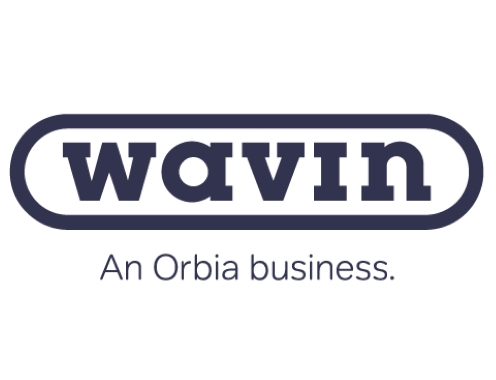Cristina Stefan - Global Finance Director at Orbia Building and Infrastructure (Wavin)


Cristina Stefan is a Global Finance Director for Orbia Building & Infrastructure (Wavin) – a global leader in innovative, healthy and sustainable solutions for the building and infrastructure industry. From clean water distribution to accessible sanitation, climate resilience to comfortable living spaces, Orbia B&I collaborate with municipal leaders, engineers, and contractors in 90+ countries worldwide, to future-proof communities and make a positive impact on people’s lives.
We took 30 minutes to tap into Cristina’s thoughts on diversity and inclusion, the skills that separate the good from the great in finance and her advice on standing out in an increasingly competitive job market.
How can leaders create diverse teams?
Firstly, I think you need open-minded leaders in place who truly and authentically believe in the power of diversity. Leaders who respect, empower and develop their employees inclusively, who recognise what makes each individual unique and can build on their core competencies and strengths.
Company culture is also hugely important. At Orbia B&I, embracing diversity is a core value – it’s embedded in everything we do and it’s constantly evolving. If you think about it, diversity is quite easy to measure – it’s looking at the gender of those in the top positions, how many people are with disabilities are hired, what’s our ethnicity split, what’s our LGBTQ+ representation, etc.
Less tangible – and therefore less easy to measure – is inclusion. For me, inclusion is the fuel that powers the diversity engine. It’s how we encourage our minority groups to collaborate and develop, feel valued, respected and empowered. Just one example would be looking at how we create equal opportunities and flexible working options for mothers returning to work after maternity leave – so they feel supported and able to thrive.
One of Orbia’s key success markers in improving diversity is to increase the representation of women and other underrepresented groups throughout the five business groups and leadership pipelines. To support us in achieving those objectives, the company has developed initiatives from talent acquisition guidelines to our Orbia Women’s Network (OWN) mentorship programme, which is helping to accelerate the development and visibility of female talent in what tends to be a very male-dominated industry. I’m a proud member and mentor myself – and because I’ve got mentees in different Orbia business groups, it brings great networking opportunities, too. It’s a good example of inclusion in action, because it encourages people to speak up, to turn challenges into opportunities with a positive mindset, show empathy and benefit from different perspectives. That blend of diversity and inclusion is how you create strong, brave teams and a working environment where everyone can perform at their best.
Which key drivers to success at Orbia B&I do you watch most?
Orbia is a proudly purpose-driven company – and at Orbia B&I, that purpose is to advance life around the world by building healthy, sustainable environments. Our employee value proposition is to bring this purpose to life. It’s a guiding principle for the way we think and act when facing some of the world’s greatest challenges, and it’s how we create products and services that improve people’s lives. For 60 years, we’ve delivered products, systems and services that create a safe & efficient water supply, better sanitation and hygiene and climate-resilient cities with advanced, energy-efficient buildings that enhance the indoor experience while minimising environmental impact. So sustainability is at the heart of what we do – and in tandem with ever-evolving innovation targets, we have multiple initiatives in place around reducing greenhouse gas emissions and waste, while improving energy efficiency.
I also keep a careful watch on B&I’s ability to adapt and flex – how well we’re optimising investments, and how agile we’re able to be in the face of market challenges, our ability to transform in order to perform, so to speak. Last but not least, giving the highest quality of service is always going to be hugely important – listening to our customers, meeting their needs and building strong relationships that stand the test of time.
What changes have you seen in the Netherlands employment market over the years – and what do you think has driven them?
It’s been nine years since I moved here – and in that time there’s been a noticeable shift. The market’s become much stronger and tighter, with more and more companies expressing a preference for native, Dutch speaking candidates over international talent. I can see the sense in this where a role requires lots of direct interaction with local authorities, or a strong working knowledge of Dutch legislation, but it could also be perceived as quite discriminatory. It’s so important to be consistent – and to promote diversity as a core company value (as many do), you have to walk the talk and demonstrate it.
I’m proud that at Orbia, we’ll always encourage people with diverse backgrounds to apply, using our talent acquisition process to eliminate bias and create equal opportunities across the business. Following the pandemic in particular, we’ve also seen a much higher demand for flexibility and hybrid working, which has brought new matching challenges to the recruitment process – for all companies.
How do you foster a positive and productive work environment, especially in challenging times?
Through leading by example. For me, that means aligning what you say with what you do, aligning ‘what’ with ‘how’ and being authentic with your teams. You sometimes need to be brave and have difficult conversations – particularly if priorities and deadlines may affect an employee’s work/life balance. Sometimes those conversations are constructive, sometimes not – but you always learn from them. You also need to be willing to challenge the status quo – especially if you see a simpler way to achieve the same outcome. That’s always a win-win.
People respond more positively to you when you show empathy, vulnerability and implicit trust. When you treat your team as business partners, not simply as doers, and give them context, they’ll be far more motivated to walk the business mile with you.
How can a job seeker stand out in the current market?
You’ve got to be authentic – show a genuine interest in the role and the company, research the people who are interviewing you and have relevant questions up your sleeve. This is, of course, assuming you’ve reached the interview phase – which has become increasingly difficult lately with the rise of AI, even for really good quality candidates.
It’s something of a paradox that while authenticity is key, you need a CV that’s carefully tailored with key words and phrases that will pass automated screening. Given these challenges, networking and taking advantage of internal referral schemes is something I highly recommend – because this can enable you to skip the initial screening stage of the recruitment process altogether and get to talk to a person about your experience with a real chance of being able to influence the outcome
In an interview situation, I always appreciate assertiveness in a candidate – someone who knows when they need to pause and recalibrate in order to get their point across more directly. I also admire honesty and realness – answering questions in a concise way with examples, rather than giving a prefabricated speech, and sharing details about their personal life, hobbies etc.if they feel confident or comfortable with it. This helps me work out whether they’ll be a good fit – not just culturally, but within the team.
So in a nutshell, my advice to potential candidates would be – dare to be different. Energise, engage and connect with your interviewer – don’t just answer their questions. And a smile goes a long way. Finally, treat rejections as opportunities to learn and improve, and send a thank you note to try to understand what you could have done differently to sharpen your gravitas next time.
How do you maintain a sense of joy and enthusiasm in your professional life?
For me, it’s seeing the bigger picture and my part in that – working with a sense of purpose, towards a greater good. Knowing the context – the ‘why’ – behind my work energises and motivates me. I need to feel engaged. From a practical point of view, I love finding ways to simplify complexity without lowering the bar. I love the feeling of building something and ‘making my mark’ – improving things and creating space for further growth. I’ll also find ways to celebrate small wins and practice gratitude, and I never underestimate the power of a thank you. Maintaining a good work-life balance also helps me stay ‘tuned’, in sync and enthusiastic about my professional world.
I’ve held numerous different finance roles throughout my career, which has taught me a lot about resilience – how to quickly learn and adapt to changing situations, whether that’s differing ways of working between industries, using new technologies or navigating company politics. Challenge and change are both huge motivators for me.
In your opinion, what are the most underrated skills or qualities in Finance?
So many people perceive finance as just number-crunching, but it’s about so much more than numbers. One of the most underrated skills is actually communication – telling the story behind the numbers. The ability to clearly and concisely explain complex financial issues to a diverse range of colleagues or customers (so that they truly understand) should not be underestimated.
Showing empathy is also key. Again, finance isn’t just about numbers – it’s about people too. Employees want to feel valued and part of a bigger story, not just enablers to achieve key deliverables faster. We have to engage, respect people’s time outside of office hours, check in and ask them how they’re feeling – not just when this or that project will be completed. Again, it’s about treating people as valued partners, rather than producers of data or analysis.
We also need critical thinkers – people who can place financials within the wider context, understand what numbers tell you and how to convey that to different audiences, evaluate financial data, make sound judgements, identify patterns and outliers to assess risks, identify opportunities and solve complex problems. And finally, emotional intelligence goes a long way. When you’re able to put yourself in other people’s shoes and preempt their emotions, you foster better quality interactions, better teamwork and better outcomes all round.
How do you make sure your strategic decisions align with both Orbia’s values and market demands?
Every decision I make is guided by Orbia’s future-fit model – those non-negotiable expectations that the company has for its employees and leaders, expectations that will help us advance life around the world. It’s a structure that ensures we work safely, ethically and according to our values – Be Brave, Take Responsibility and Embrace Diversity.
Finance isn’t a back-office function at Orbia. We’re co-pilots and business partners, helping to steer the business by showing them trade-offs and helping them make key, financially sound decisions. To do this, we need people who share the same values – people with a can-do mindset, people who are ready to go the extra mile and who are excited to be part of a company that builds the future with the solutions it creates. So you need a structure, you need a core model – and you also need the right people to apply that model to make sound decisions day-to-day, in everything they do.
Thank you to Cristina for speaking to Hannah Mallia, Director in our Finance & Accountancy recruitment team in the Netherlands.
Views and opinions contained within our Executive Interviews are those of the interviewee and not views shared by EMEA Recruitment.






You can also use your social account to sign in. First you need to:
Accept Terms & Conditions And Privacy Policy